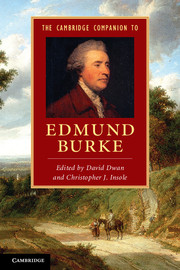Book contents
- Frontmatter
- Contents
- Contributors
- Acknowledgements
- Method of Citation
- Chronology
- Introduction Philosophy in Action
- 1 Burke’s Life
- 2 Burke, Enlightenment and Romanticism
- 3 Burke as Rhetorician and Orator
- 4 Burke’s Aesthetic Psychology
- 5 Burke on Law and Legal Theory
- 6 Burke on Political Economy
- 7 Burke and Religion
- 8 Burke and the Constitution
- 9 Burke and the Natural Law
- 10 Burke and Utility
- 11 Burke and the Ends of Empire
- 12 Burke and the American Crisis
- 13 Burke on India
- 14 Burke and Ireland
- 15 Reflections on the Revolution in France
- 16 Burke’s Counter-Revolutionary Writings
- 17 Burke in the United States
- Further Reading
- Index
- References
16 - Burke’s Counter-Revolutionary Writings
Published online by Cambridge University Press: 05 December 2012
- Frontmatter
- Contents
- Contributors
- Acknowledgements
- Method of Citation
- Chronology
- Introduction Philosophy in Action
- 1 Burke’s Life
- 2 Burke, Enlightenment and Romanticism
- 3 Burke as Rhetorician and Orator
- 4 Burke’s Aesthetic Psychology
- 5 Burke on Law and Legal Theory
- 6 Burke on Political Economy
- 7 Burke and Religion
- 8 Burke and the Constitution
- 9 Burke and the Natural Law
- 10 Burke and Utility
- 11 Burke and the Ends of Empire
- 12 Burke and the American Crisis
- 13 Burke on India
- 14 Burke and Ireland
- 15 Reflections on the Revolution in France
- 16 Burke’s Counter-Revolutionary Writings
- 17 Burke in the United States
- Further Reading
- Index
- References
Summary
Burke’s Reflections generated a huge controversial literature directed at an increasingly wider and politicised public. However, Burke neither responded directly nor addressed this emerging public. He claimed not to have read any of the responses – except Paine’s – whose Rights of Man is quoted in the Appeal, without attribution, as the views of the Foxite Whigs (Works, III: 68–75). Burke’s audience remained the traditional, and limited political ‘public’, a subset of the 400,000 or so voting individuals.
The first work to appear after Reflections was the Letter to a Member of the National Assembly. It remained – unlike Reflections – a true letter, to Francoise-Louis-Thibault de Menonville who had written to Burke praising Reflections. It contained Burke’s first insistence on outside intervention to reverse the Revolution. An Appeal from the New to the Old Whigs defended his conservative interpretation of the Glorious Revolution of 1688, and his claim to be its true inheritor, exposing the ‘new’, Foxite Whigs’ abandonment of the founding principles of their party. Following the split in the party, in A Letter to a Noble Lord (1796), he repudiated charges made by two ‘new’ Whigs, the Duke of Bedford and the Earl of Lauderdale, that it was he who was the turncoat and had reneged on his reformist past by accepting a pension from the (Tory) government. The ‘Introduction’ to Brissot’s ‘Address’ (1794) was written for a translation – commissioned by Burke from his cousin Will – of Brissot’s speech (May 1793), calling for revolution throughout Europe, so vindicating Burke’s warnings about the revolution’s expansionist character. Burke was seeking to influence a political public dismayingly unenthusiastic about counter-revolutionary war. His final published work, the Two Letters on a Regicide Peace (1796), urged continuation of an interventionist war and abandonment of the peace overtures begun that summer.
- Type
- Chapter
- Information
- The Cambridge Companion to Edmund Burke , pp. 209 - 220Publisher: Cambridge University PressPrint publication year: 2012
References
- 2
- Cited by



